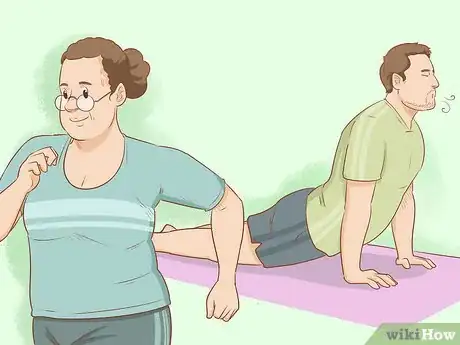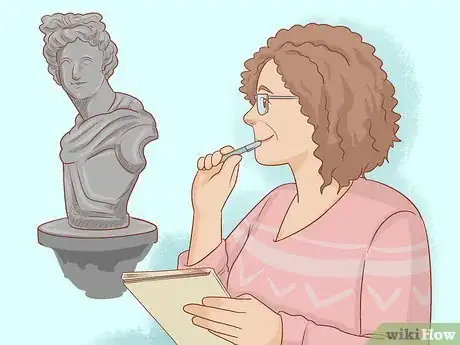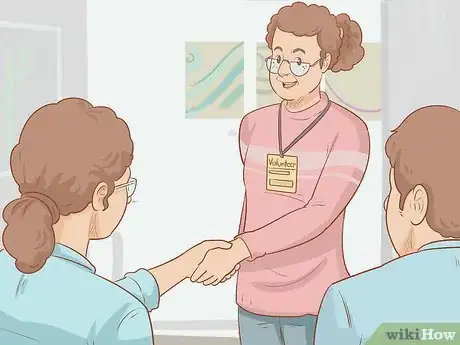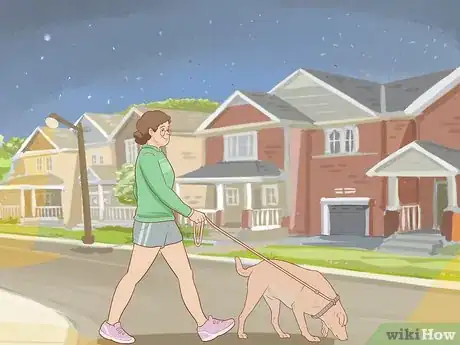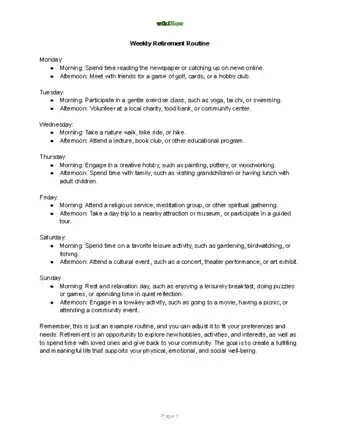This article was co-authored by Justin Barnes and by wikiHow staff writer, Madeleine Criglow. Justin Barnes is a Senior Home Care Specialist and the Co-Owner of Presidio Home Care, a family-owned and operated Home Care Organization based in the Los Angeles, California metro area. Presidio Home Care, which provides non-medical supportive services, was the first agency in the state of California to become a licensed Home Care Organization. Justin has over 10 years of experience in the Home Care field. He has a BS in Technology and Operations Management from the California State Polytechnic University - Pomona.
There are 7 references cited in this article, which can be found at the bottom of the page.
This article has been viewed 21,552 times.
Retirement offers a wealth of opportunities to do what you want with your life. When you finally reach that point, though, all that free time can start to feel overwhelming. Thankfully, there's a lot you can do to structure your days as a retiree while still enjoying all of your newfound freedom. Here are some tips on getting into a healthy routine once you've retired.
Steps
Start your day with purpose.
-
Make intentional plans for your day each morning. To get your routine on track from the start, wake up at the same time each morning and make a to-do list over breakfast. Pick 2-3 things you want to accomplish that day and write them down. Alternatively, map out the day's schedule on your phone calendar.[1] X Trustworthy Source HelpGuide Nonprofit organization dedicated to providing free, evidence-based mental health and wellness resources. Go to source
- Activities you might try keeping on your schedule include cleaning the house, meeting up with friends, and working out.
- Remember to schedule some time to relax as well. You worked hard all of your life to retire. Celebrate that by letting yourself unwind once in a while.
Keep up with your hobbies.
-
Fill up your time with what makes you happy. Think of the activities you'd long to do all day at your job. Use your newfound free time to devote your energy to those exact things. Take 1-2 hours each day to devote to your hobbies. If you don't have any hobbies you're super passionate about, try picking a new one. Some ideas include golfing, gardening, painting, and hiking. You'll gain masterful skills and feel productive.[2] X Research source
- Do you love to play guitar? Devote time to practice every day to keep getting better and better.
- Maybe you love woodworking. Take time each day to work on your craft.
- If you're nervous to try out a new hobby on your own, that's okay! Try signing up for a class to learn more and meet new people.
Maintain your social life.
-
Keeping a flourishing social routine helps you avoid feeling isolated.[3] X Trustworthy Source HelpGuide Nonprofit organization dedicated to providing free, evidence-based mental health and wellness resources. Go to source Schedule time to see your friends and family every week, and use your extra free time to make new friends. Filling up your time with social outings helps you stay connected to your community while having a great time.[4] X Expert Source

Senior Home Care Specialist Expert Interview. 6 March 2020.- An active social routine might look like meeting up with your sibling for coffee every Monday, going on a walk with your neighbor on Wednesday, and making dinner with your kids every other Friday.
- To meet new people, join a club or attend meetups in your area related to your interests. Look online, in your local newspaper, or even on the bulletin board at your local community center for good opportunities.
Get active to stay fit and healthy.
-
Try to get 30 minutes of exercise a day, 5 days a week.[5] X Trustworthy Source Centers for Disease Control and Prevention Main public health institute for the US, run by the Dept. of Health and Human Services Go to source If you're active and into sports, join a local sports team to play with other seniors. If you're not, opt for walking, biking, or aerobics instead.[6] X Research source
- Take an exercise class or join a team along with a buddy. It'll keep you motivated and help you socialize as you exercise.
- Talk to your doctor if you have a condition that prevents you from exercising regularly. They can recommend a fitness plan that includes some low-intensity exercises.[7] X Trustworthy Source Centers for Disease Control and Prevention Main public health institute for the US, run by the Dept. of Health and Human Services Go to source
Get outside every day.
-
Spending time in nature boosts your mood and keeps you active. Set aside time in your daily schedule to get some fresh air and sun. While you're out and about, try your best to stay off your phone and focus on the natural surroundings instead. [8] X Research source
- Try going to a local park, walking around your neighborhood, or even reading the newspaper outside.
- Spending more time outdoors and less time on your phone can keep your mind happy and healthy. Studies have shown that increased screen time after you've retired can have a negative impact on your mental health.
Try new things.
-
Use your extra free time to expand your interests and open your mind. First, think of all the things you've wanted to try in life. These can be big things, like skydiving, or smaller things, like eating a new type of food. Do this to stay motivated and excited about life.[9] X Expert Source

Senior Home Care Specialist Expert Interview. 6 March 2020. You might try:- Buying a cookbook and making only new recipes
- Going to the ballet for the first time
- Taking a trip to a place you've never been before
Keep track of your finances.
-
Pay your bills and check your accounts regularly. Even if you have savings, maintain a monthly budget that factors in any debts you still need to pay off, your housing and living expenses, and your entertainment and recreation needs. Keeping an eye on how you spend your money will help you feel more in control of your situation, even without the structure and income of your old job.[10] X Research source
Learn new skills or expand your education.
-
Get a degree, take classes, or teach yourself about a new subject. You've got plenty of time now to get the Master's degree you always dreamed of achieving. If you don't have a degree in mind, try taking classes at a local community college or community center. For a free option, watch and listen to educational content online.[11] X Research source
- Public universities often offer special tuition discounts for seniors. Depending on your age, you may qualify.
- If you're more interested in taking classes, opt for a subject that you've always wanted to learn more about.
- To gain knowledge for free (and from the comfort of your living room), listen to podcasts on subjects you want to learn more about or even see what's out there on YouTube.
Volunteer on a regular basis.
-
Meet new people and support your community during retirement. Give your retirement routine an even greater sense of purpose by helping out with a cause that you're passionate about. To volunteer, search online for local opportunities in your area that fit your interests.[12] X Trustworthy Source HelpGuide Nonprofit organization dedicated to providing free, evidence-based mental health and wellness resources. Go to source
- Use websites like volunteermatch.org or serve.gov to find opportunities in your area.
- You might try serving food at a shelter in your area, helping out at a local animal shelter, or even doing remote work for a local nonprofit organization.
- Other ideas include volunteering at a museum or a library.[13] X Research source
Adopt a pet if you'd like a companion.
-
Taking care of a pet adds structure (and lots of love) to your days. To care for an animal companion, like a dog or a cat, you'll have to feed them, play with them, and take them on walks. These daily responsibilities can help you stay motivated throughout the day, and the additional company adds an extra dose of joy and love to your daily routine. To adopt a pet, look online for available animals at your local animal shelter.[14] X Research source
- In addition to providing a meaningful routine, adopting an animal can help reduce your stress level, lessen your risk of anxiety and depression, and even keep your heart healthy.[15] X Trustworthy Source HelpGuide Nonprofit organization dedicated to providing free, evidence-based mental health and wellness resources. Go to source
Get a part-time job to give your routine even more structure.
-
This can benefit your routine even if you don't need the extra income. Look for opportunities that allow you to stay socially engaged, like working part-time at a local theater. If you'd like to stay engaged but are looking for something a little less physically demanding, you might try working at the front desk of a local office or business in your area. A part-time job will help you stay motivated, add to your retirement income, and give you opportunities to meet new people every day.[16] X Trustworthy Source HelpGuide Nonprofit organization dedicated to providing free, evidence-based mental health and wellness resources. Go to source
- You might also try starting a small business. If you're passionate about crafting, for example, try selling your crafts online or at local craft fairs in your area. This could be the perfect time for you to make your passion a source of additional income!
Take a daily evening walk.
-
Get fresh air and spend time around other people. Take a brisk stroll after dinner to fill your evening time with something active. It'll help clear your head and get you tired enough to fall asleep once it's nighttime.
- If you're feeling particularly tired, try sitting outside for a little while to soak up the last of the evening sun and get a breath of fresh air.
Spend some time writing or reading at night.
-
This is a relaxing way to engage your mind at the end of the day. Write down your thoughts and feelings about the day in a journal. If writing isn't your thing, devote some time to reading each day. It'll keep your mind sharp and offer a productive way to pass the time. [17] X Research source
- If you really enjoy writing and want to share your work, start a retirement blog.
- Retirement offers you more time to look back on years past than ever before. Try your hand at writing a memoir.
- Maybe you like reading but have a hard time finishing books. Join a book club so some new friends can hold you accountable. You might also try reading long-form articles or listening to podcasts instead.
Relax for an hour before bed.
-
Use this hour to get in the zone to fall asleep. Turn off your cellphone, put your laptop away, and take some deep breaths. To really relax, dim the lights, make some hot tea, and meditate. You've had a long day and have earned the time to rest!
- If you're having trouble falling asleep, read a chapter of a book before bed. Avoid playing around on your phone, as screentime before bed can disrupt your sleep cycle.
Weekly Retirement Routine
You Might Also Like
 The Top 16 Strategies to Prepare for Retirement in Your 20s
The Top 16 Strategies to Prepare for Retirement in Your 20s



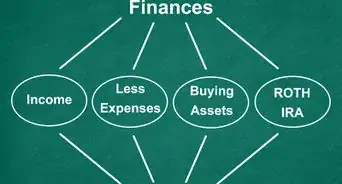









References
- ↑ https://www.helpguide.org/articles/aging-issues/adjusting-to-retirement.htm
- ↑ https://www.greatseniorliving.com/articles/what-to-do-in-retirement
- ↑ https://www.helpguide.org/articles/aging-issues/adjusting-to-retirement.htm
- ↑ Justin Barnes. Senior Home Care Specialist. Expert Interview. 6 March 2020.
- ↑ https://www.cdc.gov/physicalactivity/basics/older_adults/index.htm
- ↑ https://www.greatseniorliving.com/articles/what-to-do-in-retirement
- ↑ https://www.cdc.gov/physicalactivity/basics/older_adults/index.htm
- ↑ https://ifa.ngo/wise-words/how-to-arrange-your-daily-schedule-after-retirement/
- ↑ Justin Barnes. Senior Home Care Specialist. Expert Interview. 6 March 2020.
- ↑ https://www.inc.com/magazine/201804/kathy-kristof/happy-retirement-satisfaction-enjoy-life.html
- ↑ https://www.greatseniorliving.com/articles/what-to-do-in-retirement
- ↑ https://www.helpguide.org/articles/aging-issues/adjusting-to-retirement.htm
- ↑ https://www.greatseniorliving.com/articles/what-to-do-in-retirement
- ↑ https://newsnetwork.mayoclinic.org/discussion/your-hearts-best-friend-dog-ownership-associated-with-better-cardiovascular-health/
- ↑ https://www.helpguide.org/articles/aging-issues/adjusting-to-retirement.htm
- ↑ https://www.helpguide.org/articles/aging-issues/adjusting-to-retirement.htm
- ↑ https://www.greatseniorliving.com/articles/what-to-do-in-retirement
About This Article




